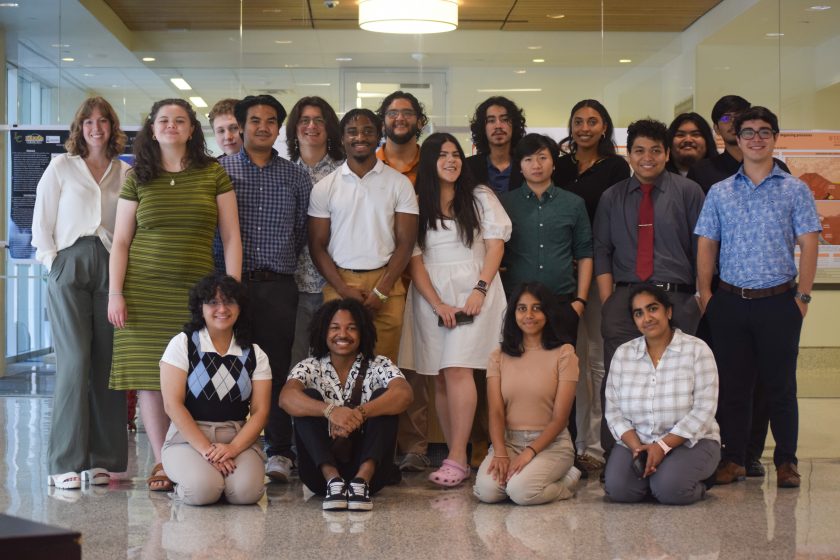Academic Programs Supporting Future Geoscientists
December 12, 2023

Each student has a unique journey to the geosciences. The Jackson School of Geosciences runs a variety of programs that help support geosciences students — and prospective and potential students — throughout their academic careers, from the start of high school on to graduate school.
This year was a particularly successfully one, with programs reaching a record number of students and increasing the involvement of scientists from across the Jackson School’s research units.
The Jackson School’s award-winning GeoFORCE program saw its highest number of participants yet, with a total of 512 students from Houston, Austin and Southwest Texas schools taking part this summer. The program helps Texas high school students from underserved areas learn about the geosciences and the college application process during summer field trips to sites across the country.
About 42% of GeoFORCE students go on to study a STEM field in college. The Jackson School’s Math and Science Institute gives GeoFORCE graduates a chance to prepare for the rigorous math and science courses ahead, as well as to learn from peer learning assistants about college life. This summer, the monthlong institute took place on The University of Texas at Austin campus and included 32 GeoFORCE graduates — about 36% of the 12th grade cohort and the highest number of students to enroll in the institute. Seven of the students are majoring in geosciences, with five enrolled at the Jackson School. Thirteen of the students are enrolled at UT Austin.
The Jackson School also hosted 20 students this summer for its Research Traineeship Experience (RTX) program, double the number that participated in 2022. The program is open to recent STEM graduates and STEM undergraduates, including students enrolled in community colleges, with plans to enroll in four-year universities. This year students came from as far away as Alaska and Puerto Rico.
The nine-week program brings students to the UT Austin campus, where they are paired with faculty mentors and participate in learning modules that teach technical skills used in geosciences and STEM research. This year’s mentors included researchers from all three of the Jackson School’s research units. Following the program, two RTX students also attended a graduate-level workshop hosted by Professor Thorsten Becker on megathrust earthquake modeling. All 20 of the students gave poster presentations on their research at a UT-wide summer symposium. What’s more, some of the RTX students will be sharing their research findings during student poster sessions at the annual meetings of the American Geophysical Union and the Geological Society of America.
The Jackson School’s Gateway to Graduate Studies in Science program (G2S2) also had over 90 applicants, triple the previous record. The program, which was formerly called EDGE, invites a group of prospective graduate students to visit the Jackson School — with all travel, food and lodging costs covered — so they can meet current students and faculty members and learn about research and funding opportunities at the school.
Jackson School Dean Claudia Mora said that the programs create a geosciences “ecosystem” of sorts, building a diverse web of community connections and tangible support. She said that she was thrilled to see so many people, from high school freshmen to seasoned scientists, taking part. “These programs can help the next generation of geoscientists succeed not just today, but in the long run, too,” Mora said.
If you’re interested in supporting these programs, please contact Chief Development Officer Andrew West, awest@austin.utexas.edu
Back to the Newsletter